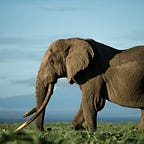How much land must we conserve to save wild species?
New research led by Koobi Carbon, and published in the prestigious journal Science, sheds light on this fundamental question…
Wildlife desperately needs our help. We need to conserve habitat for wild species to survive in. Places where they can migrate, hunt, nest, reproduce, and evolve in peace. Places where ecological processes such as the carbon and water cycles can keep functioning and support all life — including ours.
But until now scientists didn’t know how much land to conserve to save species, and didn’t have good maps of where to act. Dr James Allan, Koobi co-founder, and his team used advanced spatial algorithms to map the optimal areas for conserving terrestrial species and ecosystems across the worldwide. Here, we present the findings which include:
- Maps of the land we must conserve globally to stop species extinctions
- Analyses of how much of this land will be destroyed by people in the next few decades — unless we act NOW
- Analyses of the number of people who live in these places — who we need to work with and empower to save their land
64 million km2 — 44% of Earth’s land area — requires conservation to save wild species and ecosystems.
We reached this number by 1) combining the worlds current protected areas, ecologically intact areas, key biodiversity areas, 2) seeing which species where still not adequately protected, and 3) running a spatial optimization analysis to identify the best places to conserve them.
We also looked at how much of this land is at risk of being damaged by human activities…
Over 1.3 million km2 — an area larger than South Africa — is likely to be converted for human uses by 2030, which would be devastating for wildlife. By 2050, we could lose up to 3 million km2 of habitat, an area the size of Greenland. And this is all under a business-as-usual development scenario, it’s not even worst case.
Africa — our home continent — is clearly the front line.
All is not lost though. If we invest in a green economy we can limit this to just a few hundred thousand km2. So there is a large window of opportunity but it is closing fast.
What would a green economy involve? Staying below the Paris Agreement 1.5 degree emissions target, scaling up nature-based businesses such as carbon credit projects and markets, and consuming and flying less. This done hand-in-hand with substantial up scaling of conservation efforts would guarantee our children and grandchildren can still see lions and elephants just like us…
The team also found that 1.8 billion people live in the mapped areas. There is no way around this, people are pretty much everywhere now. In some cases they are a threat, but in others an opportunity.
By making forests and natural areas valuable for people we can create incentives for them to conserve the land and wildlife. This is exactly what is happening in all the Koobi carbon projects. By making a platform for you to offset your carbon footprints by investing in these projects we’ve opened up an avenue for you to contribute to global species conservation. This has always been our aim from the beginning.
So where next? Well, the world is gearing up to sign a big conservation agreement under the United Nations later this year. The headline target is a call for countries to conserve 30% of their land by 2030. This paper provides scientific support for a bold target such as this and can support negotiations and guide action. Lets hope they listen!
We are very open to any thoughts or questions :)
